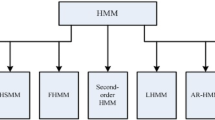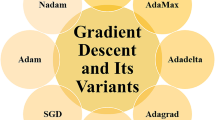Abstract
The paper reviews the role of sensors as a variable depicting information in a stochasticprogram. Through examples, and with mathematical analysis of random measures, it isshown how policy variables affect the sensors in a given problem. Sensors are amenable tomathematical derivations. It is shown how the trade‐off between the gain from introducingnew information into the problem, and the cost of that action, can be addressed. Suggestionsfor further investigation are offered.
Similar content being viewed by others
References
A. Adam, A model of the trade-off between the cost of information and its utility, MSc. Dissertation, The Weizmann Institute of Science, Rehovot, 1996.
B. Allen, Neighboring information and distribution of agents' characteristics under uncertainty, J. Mathematical Economics 12(1983)63–101.
B. Allen, Convergence of σ-fields and applications to mathematical economics, in: Selected Topics in Operations Research and Mathematical Economics, eds. G. Hammer and D. Rallaschke, Lecture Notes in Economics and Mathematical Systems 225, Springer, Berlin, 1984, pp. 161–173.
B. Allen and T. Van Zandt, Uniform continuity of information combination: A corrigendum, J. Mathematical Economics 21(1992)453–459.
Z. Artstein, Sensitivity to σ-fields of information in stochastic allocation, Stochastics and Stochastics Reports 36(1991)41–63.
Z. Artstein, Sensitivity with respect to the underlying information in stochastic programs, J. Computational and Applied Mathematics 56(1994)127–136.
Z. Artstein, Probing for information in two-stage stochastic programming and the associated consistency, in: Asymptotic Statistics, eds. P. Mandl and M. Hušková, Springer, Berlin, 1994, pp. 21–33.
Z. Artstein, Relaxation with Young measures and best approximation in Lp spaces, Research Report, The Weizmann Institute, Rehovot, May 1997.
Z. Artstein and R.J-B Wets, Sensors and information in optimization under stochastic uncertainty, Mathematics of Operation Research 18(1993)523–547.
Z. Artstein and R.J-B Wets, Stability results for stochastic programs and sensors, allowing for discontinuous objective functions, SIAM J. Optimization 4(1994)537–550.
R.B. Ash, Information Theory, Wiley, New York, 1966.
R.B. Ash, Real Analysis and Probability, Academic Press, New York, 1972.
M. Avriel and A.C. Williams, The value of information and stochastic programming, Operations Research 18(1970)947–954.
B. Bassan and M. Scarsini, On the value of information in multi-agent decision theory, J. Mathematical Economics 24(1995)557–576.
A. Ben-Tal and E. Hochman, Stochastic programs with incomplete information, Operations Research 24(1976)336–347.
D. Bertsekas and S.E. Shreve, Stochastic Optimal Control: The Discrete Time Case, Academic Press, New York, 1978.
P. Billingsley, Convergence of Probability Measures, Wiley, New York, 1968.
J.R. Birge, The value of the stochastic solution in stochastic linear programs with fixed recourse, Mathematical Programming 24(1982)314–325.
J.R. Birge and M. Teboulle, Upper bounds on the expected value of a convex function using gradient and conjugate function information, Mathematics of Operations Research 14 (1989)745–759.
E.S. Bolyan, Equiconvergence of martingales, Annals of Mathematical Statistic 42(1971)552–559.
N.N. Čencov, Statistical Decision Rules and Optimal Inference, Translations of Mathematical Monographs, Vol. 53, American Mathematical Society, Providence, 1982.
K. Cotter, Similarity of information and behavior with a pointwise convergence topology, J. Mathematical Economics 15(1986)25–38.
K. Cotter, Convergence of information, random variables and noise, J. Mathematical Economics 16(1987)39–51.
M.H. DeGroot, Optimal Statistical Decisions, McGraw-Hill, New York, 1970.
M.A.H. Dempster, On stochastic programming. II: Dynamic problems under risk, Stochastics 25(1988)15–42.
L.E. Dubins and D.A. Freedman, Random distribution functions, Bulletin American Mathematical Society 69(1963)548–551.
J. Dupačová, Stochastic programming with incomplete information: A survey of results on post optimization and sensitivity analysis, Optimization 18(1987)507–532.
J. Dupačová, Stability and sensitivity analysis for stochastic programming, Annals of Operations Research 27(1990)115–147.
J. Dupačová, On statistical sensitivity: An analysis in stochastic programming, Annals of Operations Research 30(1991)199–214.
Yu. Ermoliev, A. Gaivoronski and C. Nedeva, Stochastic optimization problems with incomplete information on distribution functions, SIAM J. Control Optimization 23(1985)697–716.
T.S. Ferguson, Mathematical Statistics. A Decision Theoretic Approach, Academic Press, New York, 1967.
D.B. Hausch and W.T. Ziemba, Bounds on the value of information in uncertain decision problems II, Stochastics 10(1983)181–217.
C.C. Huang, I. Vertinsky and W.T. Ziemba, Sharp bounds on the value of perfect information, Operations Research 25(1977)128–139.
C.C. Huang, W.T. Ziemba and A. Ben-Tal, Bounds on the expectation of a convex function of a random variable: With applications to stochastic programming, Operations Research 25(1977) 315–325.
C.-F. Huang and R.H. Litzenberger, Foundation of Financial Economics, North-Holland, New York, 1988.
P. Kall and S.W. Wallace, Stochastic Programming, Wiley, Chichester, 1994.
A.N. Kolmogorov, Foundation of the Theory of Probability, English translation, Chelsea, New York, 1950.
H. Kudo, A note on the strong convergence of σ-algebras, Annals of Probability 2(1974)76–83.
S. Kullback, Information and Statistics, Wiley, New York, 1959.
D. Landers and L. Rogge, An inequality for the Haousdorff-metric of σ-fields, Annals of Probability 14(1986)724–730.
M. Loève, Probability Theory II, 4th ed., Springer, New York, 1978.
P.A. Meyer, Probability and Potential, Blaisdell, Waltham, 1966.
J. Neveu, Mathematical Foundations of the Calculus of Probability, Holden-Day, San Francisco, 1965.
J. Neveu, Note on the tightness of the metric on the set of complete sub σ-algebras of a probability space, Annals Mathematical Statistics 43(1972)1369–1371.
A. Prékopa, Stochastic Programming, Kluwer, Dordrecht, 1995.
S.B. Richmond, Operations Research for Management Decisions, Ronald Press, New York, 1968.
L. Rogge, Uniform inequalities for conditional expectations, Annals of Probability 2(1974)486–489.
H. Scarf, A min-max solution of an inventory problem, in: Studies in the Mathematical Theory of Inventory and Production, eds. Arrow, Karlin and Scarf, Stanford University Press, Stanford, 1958, pp. 201–209.
M.B. Stincombe, Bayesian information topologies, J. Mathematical Economics 19(1990)233–253.
M.B. Stincombe, A further note on Bayesian information topologies, J. Mathematical Economics 22(1993)189–193.
M.H. van der Vlerk, Stochastic programming bibliography, Internet, 1997 edition, http://mally.eco.rug.nl/biblio/stoprog.html.
J.M. Wagner and O. Berman, Models for planing capacity expansion of convenience stores under uncertain demand and the value of information, Annals of Operations Research 59(199519–44.
A. Wald, Statistical decision functions, Annal. Math. Statistics 20(1949)165–205
W.T. Ziemba and J.E. Butterworth, Bounds on the value of information in uncertain decision problems, Stochastics 1(1975)361–378.
Rights and permissions
About this article
Cite this article
Artstein, Z. Gains and costs of informationin stochastic programming. Annals of Operations Research 85, 129–152 (1999). https://doi.org/10.1023/A:1018913609464
Issue Date:
DOI: https://doi.org/10.1023/A:1018913609464




